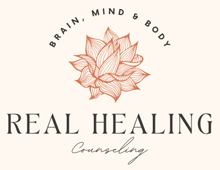Let’s be real: asking for help can be hard.
If you’re here, reading this, there’s probably a part of you that wonders if things could be different. Maybe you’re exhausted by the endless cycle of disordered eating—trying to “be good” with food, slipping up, feeling guilty, swearing you’ll get back on track, and then starting all over again. Maybe you feel like disordered eating is controlling your life, or your body feels like something you have to fight against every single day.
“But What If My Disordered Eating Isn’t That Bad?”
A lot of people with disordered eating think, I don’t have an eating disorder, so I don’t really need help.
But let me ask you this: Is food taking up more space in your mind than it should?
Do you spend more time than you’d like thinking about what you’re eating, what you should be eating, what you shouldn’t have eaten, or how to make up for it?
Do you ever feel anxious, guilty, or ashamed after eating?
Do you avoid certain foods because you’re afraid of what they’ll do to your body?
Do you feel like you need to “earn” your meals by exercising or restricting?
If any of that sounds familiar, you don’t have to wait until disordered eating gets “bad enough” to get support. Struggling with food is struggling with food—there’s no minimum requirement of suffering before you deserve help.
“But What If I Don’t Know How to Explain My Disordered Eating?”
That’s okay. You don’t have to walk into therapy with a fully formed speech about your disordered eating.
A good therapist isn’t waiting for you to present a perfectly packaged explanation. They’re there to help you untangle things, to put words to feelings, and to figure out what’s underneath the stress, the rules, the patterns, the shame.
You can literally start with:
“I don’t really know why I’m here, but food has felt hard for a long time.”
Or:
“I don’t know if this is even a big deal, but I feel like I spend way too much time thinking about food and my body.”
Or even:
“Someone told me I should talk to someone about my disordered eating, and I don’t know how I feel about that.”
That’s enough. You don’t have to have the perfect words. Just showing up is enough.
“But What If Therapy Means Giving Up Control Over My Disordered Eating?”
If you’ve struggled with disordered eating, you probably know what it feels like to need control. Controlling food can feel like controlling life itself—like the one thing you can hold onto when everything else feels too much.
So, let me be clear: Therapy isn’t about taking away your control. It’s about helping you find freedom in a way that feels safe.
You won’t be forced to eat differently. No one is going to demand that you start eating certain foods or change everything overnight. A good therapist will help you move at a pace that feels right for you and your disordered eating recovery.
“But What If Therapy Doesn’t Help My Disordered Eating?”
This is a real fear. What if you take the leap and it just… doesn’t work?
The truth? Sometimes therapy takes time. Sometimes it takes a few tries to find the right therapist. Sometimes healing from disordered eating isn’t linear, and it feels like nothing is changing—until one day, you realize that the thoughts that used to consume you are a little quieter.
But even if it takes time, you are worth trying.
Even if you don’t feel ready to face your disordered eating, you are worth trying.
Even if part of you wants to heal and part of you isn’t sure, you are worth trying.
What Therapy Actually Looks Like for Disordered Eating
A lot of people imagine therapy as sitting across from a stranger while they analyze you and tell you what’s wrong with you. But that’s not what good therapy is.
Good therapy is:
- Having a space where you can say things out loud that you’ve been carrying alone for years.
- Realizing that your disordered eating isn’t about a lack of willpower or discipline—there’s something deeper, and it’s not your fault.
- Slowly, gently unlearning the food rules and body shame that have been weighing you down.
- Finding different coping mechanisms so you don’t have to rely on disordered eating to feel okay.
- Learning to trust yourself again.
“What If I’m Not Ready to Talk About My Disordered Eating?”
That’s okay, too. You don’t have to force yourself into therapy before you’re ready. But if you’re even a little curious, you might try:
- Journaling about your thoughts and feelings around disordered eating to start noticing patterns.
- Listening to a podcast or reading a book about intuitive eating or food freedom.
- Talking to someone you trust—even just saying, “I think I might need some help with my disordered eating” can be a huge step.
And when you are ready, therapy will be there. No judgment. No pressure. Just support.
You Don’t Have to Live with Disordered Eating Forever
If disordered eating feels like a constant battle, if your body feels like a war zone, if you’re tired of feeling stuck—you don’t have to live like this forever.
Healing from disordered eating is possible. A life where food doesn’t control you is possible. A life where you feel at home in your body is possible.
And you don’t have to do it alone.
Whenever you’re ready, help is here. And you deserve it.
